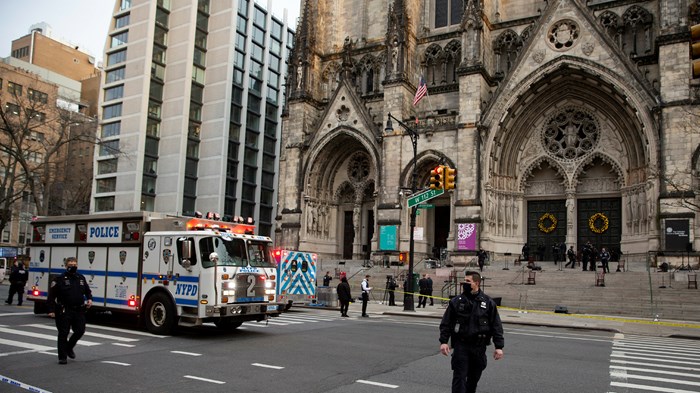A man was fatally shot in the head by police on the steps of a landmark New York City cathedral Sunday afternoon after he began firing two semiautomatic handguns at the end of a Christmas choral concert, police said.
A detective, a sergeant, and an officer fired 15 rounds after the man started shooting just before 4 p.m. at the Cathedral of Saint John the Divine, mother church of the Episcopal Diocese of New York, New York Police Commissioner Dermot Shea said.
“It is by the grace of God today,” Shea said, that no one besides the gunman was struck.
Witnesses told police the man was yelling “kill me” as he fired, Shea said. The man’s name was withheld pending positive identification.
The man had a lengthy criminal history and was carrying a backpack containing a can of gasoline, rope, wire, tape, knives, and a well-worn Bible, Shea said. The police commissioner called the actions of the officers “heroic.”
The 45-minute concert had just concluded and people were starting to walk away when a series of shots was heard, sending people running down Amsterdam Avenue screaming and diving to the sidewalk.
The gunman was dressed in black with his face obscured by a white baseball cap and a face mask. He held a silver pistol in one hand and a black one in the other as he stepped from behind a stone column at the top of the staircase.
A video posted on social media by one bystander showed officers crouched behind trash cans yelling “drop the gun!” and firing carefully aimed shots at the man for at least a minute and half as he darted in and out from behind a pillar.
Some terrified civilians lay prone at the bottom of the steps, clutching each other during the gunfire. Others cowered behind a lamp post. They ran for safety after the gunman was felled by an officer's shot.
Before the gunfire began, the concert featured members of the cathedral choir standing far apart on the stone steps wearing masks because of the coronavirus pandemic.
“It was just beautiful, and then at the end this person started shooting. Everybody is in shock,” a cathedral spokeswoman, Lisa Schubert, told The New York Times. “The shooter could have killed a lot of people. There were hundreds of people here and he shot at least 20 times.”
It wasn’t clear if the gunman was aiming at people or firing in the air.
“It is horrible that our choir’s gift to New York City, a much-needed afternoon of song and unity, was cut short by this shocking act of violence,” cathedral spokeswoman Iva Benson said by email.
The cathedral is one of the world’s largest. Construction began in 1892 and is still incomplete. The church has been connected to many New York luminaries and notable events over its long history. President Franklin Delano Roosevelt was a trustee. It hosted the memorial services for puppeteer Jim Henson and choreographer Alvin Ailey, and speakers over the years including South Africa’s Nelson Mandela and Archbishop Desmond Tutu.






